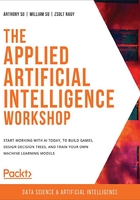
AI Tools and Learning Models
In the previous sections, we discovered the fundamentals of AI. One of the core tasks of AI is learning. This is where intelligent agents come into the picture.
Intelligent Agents
When solving AI problems, we create an actor in the environment that can gather data from its surroundings and influence its surroundings. This actor is called an intelligent agent.
An intelligent agent is as follows:
- Is autonomous
- Observes its surroundings through sensors
- Acts in its environment using actuators (which are the components that are responsible for moving and controlling a mechanism)
- Directs its activities toward achieving goals
Agents may also learn and have access to a knowledge base.
We can think of an agent as a function that maps perceptions to actions. If the agent has an internal knowledge base, then perceptions, actions, and reactions may alter the knowledge base as well.
Actions may be rewarded or punished. Setting up a correct goal and implementing a carrot and stick situation helps the agent learn. If goals are set up correctly, agents have a chance of beating the often more complex human brain. This is because the primary goal of the human brain is survival, regardless of the game we are playing. An agent's primary motive is reaching the goal itself. Therefore, intelligent agents do not get embarrassed when making a random move without any knowledge.